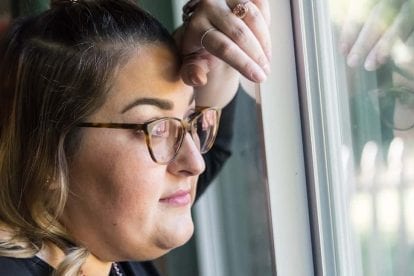How the Trauma of Childhood Abuse Affects Interpersonal Relationships, and How to Begin Healing

The trauma of childhood abuse can have long-lasting repercussions that affect your understanding of yourself and the world around you. For many, the effects of abuse manifest in dysfunctional interpersonal relationships as the result of attachment disruptions at pivotal points of childhood development. By examining the impact of childhood abuse on interpersonal relationships and the role of therapy in healing, you can gain a greater understanding of both your experiences and the possibilities for recovery.
“My earliest memories are of being scared,” says Tess. “When people talk about carefree childhoods, I cannot relate. The experience of growing up without fear is very foreign to me.” Tess, now 31, experienced abuse at the hands of her father from a young age. While her mother didn’t participate directly in the abuse, she also didn’t intervene for fear that her husband’s anger would turn against her. “Essentially, I was left to cope with these overwhelming experiences by myself. No one outside the family knew and I was too frightened to tell anyone,” she explains. “Part of me just assumed no one would care. And another part was scared of what would happen if they did.”
While Tess was outwardly silent about her abuse, internally, she clung to an escape narrative that hinged on the freedom of adulthood. As she packed her bags for college, she knew she would never return to her parents’ home. “Walking out that door was exhilarating,” she tells me. “But in many ways, I carried the abuse with me. It informed how I saw myself and how I interacted with other people. For many years it stripped me of the ability to have healthy relationships and it took a long time to truly become free.”
The trauma of childhood abuse can have long-term effects that continue to shape your sense of self and the world around you in adulthood. Often, one of the most tragic consequences of such trauma is its impact on your interpersonal relationships; by disrupting healthy development in your formative years, childhood abuse can deeply compromise your ability to form and maintain the healthy bonds that nurture us throughout our lives. For many survivors, understanding how the effects of trauma manifest in interpersonal relationships is an important step toward creating greater self-awareness and starting the healing journey.
Childhood Abuse and Attachment Disruption
Human beings are innately social beings. From the time we are born, our identities and our ability to make sense of the world around us are continuously shaped by our social interactions. The most significant of these interactions typically occur in early childhood, when attachment to others—particularly caregivers—first forms.
“Attachment is the emotional bond that is formed between objects in order to establish a sense of security and safety,” explains psychologist Dr. Graham A. Barker. A secure attachment provides:
- An internal feeling of security even in the presence of distress
- Confidence in your ability to engage with the world around you
- A stable sense of identity and the ability to understand the thoughts, feelings, and behaviors of both yourself and others
In other words, secure attachment creates a solid foundation for understanding yourself and others, fosters healthy self-sufficiency and positive interactions with others, and strengthens your resilience. It acts as a kind of psychological template that guides both current and future experiences, informing your emotions, beliefs, expectations, and ability to form subsequent healthy attachments throughout life.
In early childhood, secure attachment develops within loving, nurturing, and stable relationships in which your emotional and practical needs are met, offering a kind of oasis in times of distress. However, when your early childhood experiences are marked by abuse, your ability to form such attachments is disrupted, resulting in attachment injury. This is particularly true if your caregivers—especially your parents—are the perpetrators of abuse. However, abuse by anyone at these critical developmental stages can compromise attachment and strip you of the benefits of these secure bonds. This, in turn, can have profoundly damaging effects on every aspect of your life and especially on your future interpersonal relationships.
Call for a Free Confidential Assessment.
877-727-4343The Impact of Childhood Abuse on Interpersonal Relationships
In the absence of secure attachments, survivors of childhood abuse often develop dysfunctional attachment styles that disrupt your ability to interact with others in healthy ways. This is true of all forms of abuse, including physical, emotional, and sexual abuse. In fact, contrary to what many assume, researchers have found that emotional abuse, neglect, and sexual abuse are more strongly associated with interpersonal distress in adulthood than physical abuse. However, it is important to remember that any abuse survivor can experience profound interpersonal difficulties, including:
- An inability to trust: The ability to trust others is a critical part of forming and maintaining healthy relationships. When someone has experienced childhood abuse, however, that ability is often diminished or even removed altogether. As a result, you may be reluctant to engage in honest and open relationships for fear that you will be betrayed or harmed. By staying closed off, guarded, or hypervigilant, it can be difficult for others to feel close to you and you deny yourself the opportunity to form healthy and meaningful bonds. The lack of trust also affects all insecure attachment styles.
- Avoidant attachment: Some people who do not experience the benefit of secure attachment in childhood decide—consciously or unconsciously—to avoid attachment to others altogether. While this is often driven partially by an inability to trust others, it also arises due to the extreme self-reliance many survivors of abuse have to develop at critical developmental stages; if you have learned from an early age that you cannot rely on others to meet your attachment needs, you may decide to ignore those needs or attempt to meet them yourself. In adulthood, this typically translates to social avoidance or the formation of emotionally distant relationships in which you remain unresponsive to the needs of others.
- Ambivalent attachment: Many people who experience childhood abuse develop an ambivalent attachment style, particularly if the abuser oscillated between responsiveness and neglect. “If this is your attachment style, you likely desire lots of intimacy and are ever watchful of change in your relationship, sometimes to the point of paranoia,” explains Dr. Andrea Brandt. “You may feel like you’re more devoted to [others] than [they are] to you, have low self-esteem, and show a high level of emotional dysregulation.” These patterns arise from the unpredictability and anxiety that marked your formative social experiences, often resulting in deep insecurity and clinginess in relationships. But while you may feel an overwhelming need for connection, you may also become easily frustrated and resentful, particularly if you feel misunderstood or vulnerable.
- Disorganized attachment: People who experience disorganized attachment are deeply fearful of relationships while simultaneously craving emotional closeness. You are at once afraid of intimacy and of being alone. As a result, you may lash out if you feel ignored or unloved while at the same time being reluctant to show affection for others. These patterns create significant barriers to forming and maintaining healthy relationships and are compounded by poor emotional regulation skills, difficulty understanding social cues, and deep distrust of others.
People who experience childhood abuse are vulnerable to developing mental health disorders that compromise emotional and behavioral stability, including depression, anxiety, PTSD, and borderline personality disorder. These illnesses can present additional challenges to engaging in healthy interpersonal relationships.
The diminished ability to participate in stable, mutually satisfying relationships can have significant consequences for abuse survivors. Not only do attachment needs continue to go unmet, you are also vulnerable to engaging in destructive behaviors and relationship dynamics that cause additional damage your psychological health and further disrupt the potential for healthy attachment formation. This is particularly true if you are drawn to individuals who, as Dr. Grant Hilary Brenner describes it, “fit [your] traumatic identity.” As a result, you may surround yourself with emotionally unavailable or even abusive people or find yourself engaging in co-dependent relationships. This may not only “lock one into [your] old identity while preventing new identities from taking root,” it can also lead to traumatic bonding or retraumatization that create further emotional damage.
The Role of Therapy in Healing from Childhood Abuse
Healing from the trauma of childhood abuse can be a difficult process, in part because addressing painful memories is often an uninviting prospect. Additionally, the very interpersonal dysfunction caused by abuse can make you reluctant to engage in the therapeutic process. However, therapy is the best way to recover from childhood abuse and gain the insight and skills necessary to improve interpersonal functioning.
There is a broad variety of therapeutic modalities proven to help abuse survivors regain psychological health. While the specifics of these modalities may differ, at their core is the presence of a healthy therapeutic alliance, or trusting bond between therapist and client. This bond can act as a key component of healing from attachment disruptions by allowing you to move toward a healthier attachment style. By creating a safe, supportive relationship in which your thoughts and feelings are validated and understood, your therapist can help you heal from attachment injuries while modeling what secure attachment looks like. At the same time, you are able to process and resolve your traumatic memories while addressing traumatic effects such as emotional dysregulation, unstable identity, and unhealthy patterns of thought and behavior. As such, you can move toward improved psychological harmony, resilience, and a newfound understanding of how to form and maintain healthy, meaningful, and fulfilling personal relationships.
For many, seeking specialized childhood trauma treatment in the context of a residential treatment program offers the best way of finding rapid relief from suffering. The immersive nature of these programs means that you are able to quickly develop trusting therapeutic relationships and engage in the deep therapeutic work necessary for durable healing. Additionally, residential environments allow you to continuously practice new interpersonal skills in a safe, supportive environment, surrounded by highly trained clinicians and compassionate peers who understand what you are going through. If you struggle with a mental health disorder such as depression, anxiety, PTSD, or borderline personality disorder, this can also be addressed through comprehensive treatment in order to help you achieve the best outcomes.
You can step beyond your abuse and realize that you are more than your traumatic identity. By working collaboratively with your treatment providers, you can heal old wounds and create a strong foundation for ongoing self-growth and social connectedness, giving you the freedom to create the life you truly want.
Bridges to Recovery offers comprehensive treatment for people struggling with childhood trauma as well as co-occurring mental health disorders and substance use disorders. Contact us to learn more about our renowned Los Angeles programs and how we can help you or your loved one start the journey toward healing.






